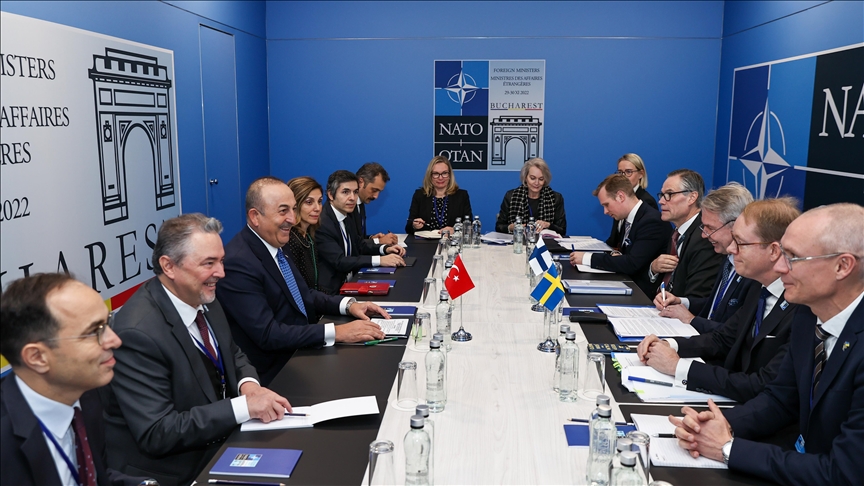

By Anadolu Agency
ANKARA
Türkiye’s foreign minister on Wednesday said a trilateral meeting with his Swedish and Finnish counterparts on the sidelines of a NATO gathering had followed up on the Nordic countries’ bids to join the military alliance, but that Sweden needs to take more steps against terrorism.
“In yesterday’s meeting, we welcomed the steps taken (towards membership) and the determination of the new Swedish government, which is more determined than the previous one,” Mevlut Cavusoglu told a news conference following a NATO foreign ministers meeting in the Romanian capital Bucharest.
After Sweden and Finland announced their NATO bids in May, Turkish officials voiced concerns over the countries’ tolerance and even support for terrorist groups. In a trilateral meeting in June, the three countries signed a memorandum under which the Nordic countries pledged to address Ankara’s concerns.
Türkiye has yet to see any concrete steps from Sweden on the extradition of criminals, freezing of terror assets, and ending terrorist activities in the country, Cavusoglu said, citing legislation in this regard, but stressed they want to see the laws “implemented.”
“Separately from NATO accession bids, we’re aware that the new government is more sincere in fighting terrorism,” he added, referring to Sweden’s government that took power in October.
Following the latest terror attacks in Türkiye, Cavusoglu said Sweden has made “statements that were much stronger than some other (NATO) allies.”
“Such statements are good, determination is good but we need to see concrete steps. We addressed these openly and agreed to continue together our efforts in this regard,” he added.
On the war in Ukraine, Cavusoglu said Türkiye continues its humanitarian aid to Ukraine and its people, and vowed to continue efforts for confidence-building measures.
“Our greatest goal is to keep diplomatic channels open. We are explaining and showing the necessity of maintaining diplomacy even when the war continues,” he said.
Asked about Türkiye’s expectations from NATO allies on its anti-terror efforts, Cavusoglu said: “The support of some allies, particularly the US, for terror groups in Syria is crystal clear. Thus, we reiterate the need to end these kinds of support.”
Cavusoglu also lashed out at some countries’ statements which “attempt to block” Ankara’s counter-terrorism efforts while backing them at the same time.
“In some of the bilateral talks, such comments were made and we gave them the necessary response. We expect support from allies. We told them that we do not want to hear statements supporting terrorists or trying to show them as victims,” he stressed.
Türkiye has long protested US support for the terrorist group YPG/PKK in northern Syria, along Türkiye’s borders, with Washington saying it allies with the group to fight Daesh/ISIS. Turkish authorities say it makes no sense to use one terrorist group to fight another.
In its more than 35-year terror campaign against Türkiye, the PKK – listed as a terrorist organization by Türkiye, the US and EU – has been responsible for the deaths of more than 40,000 people, including women, children and infants. The YPG is its terrorist branch in Syria.
Cavusoglu also addressed a recent deadly fire in China’s Xinjiang Uyghur Autonomous Region and said that China is yet to provide any convincing explanation regarding the incident.
The fire broke out in a residential building in Urumqi that was reportedly under a coronavirus lockdown, leaving 10 people dead.
At the NATO meeting, the top Turkish diplomat underscored that terror is “the most important asymmetric threat that the NATO is facing.”
“Also, we have suggested appointment of a special representative for counter-terrorism within NATO,” Cavusoglu said, adding that such a designation must be made before the next NATO leaders’ summit in Vilnius, Lithuania on July 11-12, 2023.
We use cookies on our website to give you a better experience, improve performance, and for analytics. For more information, please see our Cookie Policy By clicking “Accept” you agree to our use of cookies.
Read More